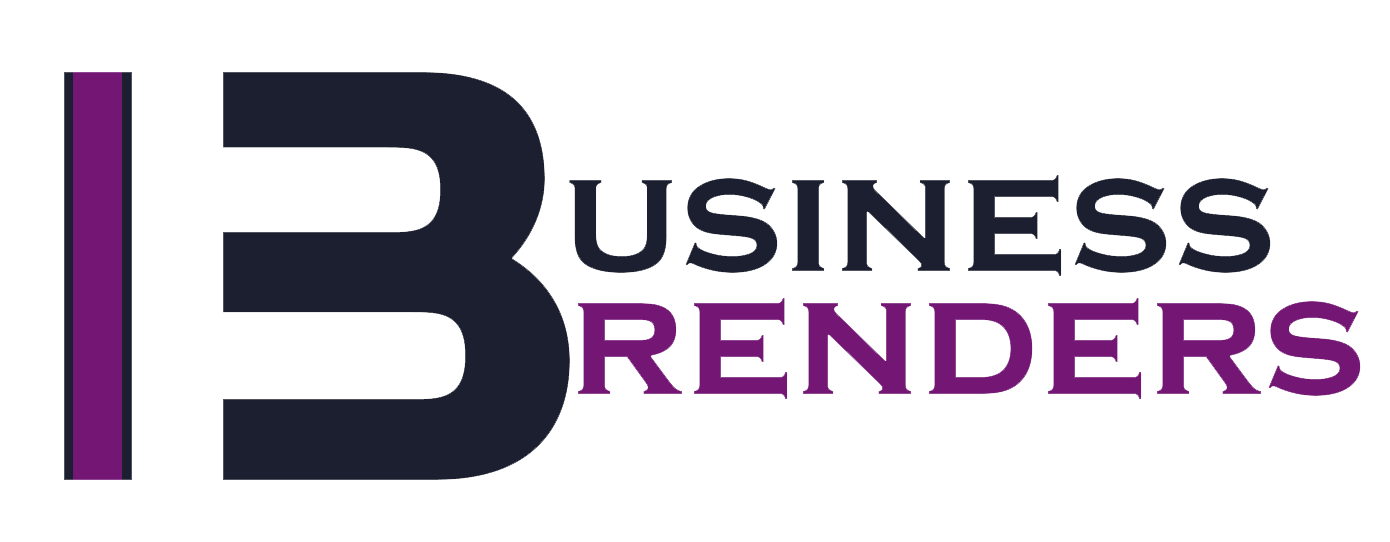Salesforce is one of the great CRM software, but it is not the perfect one. Sometimes, companies require a more affordable solution, while others find difficulty in customization and integration. On the other hand, some companies may want a 2-in-1 solution, a tool that is a combination of both CRM and ERP modules. In that case, they switch to Salesforce alternatives.
Below, we will discuss the 6 major companies that are the biggest Salesforce competitors and offer solutions that businesses find more useful. Moreover, we will also take a quick look at Salesforce’s pros and cons. So, without further waiting, let’s start!
Salesforce: Bright & Dark Side
Although you’ve been seeking Salesforce alternatives, it is better to learn more about its positive sides. Here are a few of its advantages listed with a brief description. However, you can read about Salesforce benefits in more detail in our other guide.
- Customization & Flexibility: Salesforce offers extensive customization options, allowing businesses to tailor the CRM to their specific needs.
- Scalability: It caters to businesses of all sizes, from startups to enterprises, enabling them to expand as needed without significant disruptions.
- Integration Capabilities: You can integrate it well with numerous third-party apps and systems, facilitating a seamless flow of data across various platforms.
- Cloud-Based Accessibility: Accessible from anywhere with an internet connection, Salesforce’s cloud-based system ensures real-time updates and collaboration among teams.
- Community Support: It has a vast user community, offering forums, resources, and support to everyone in need.
However, it also has some limitations. You can also check out another guide on Salesforce drawbacks, which has described its major limitations in detail. A couple of those limitations are mentioned below:
- Complexity & Learning Curve: Its extensive functionalities can lead to a steep learning curve, especially for users new to CRM or complex software systems.
- Customization Complexity: While the customization options are vast, complex customizations might require technical expertise or the involvement of developers. It can add to the implementation time and cost.
Salesforce Alternatives
While Salesforce has its advantages and disadvantages, businesses like to consider some other platforms for their CRM requirements. Hence, below are the top Salesforce alternatives, discussed in detail.
1. Microsoft Dynamics 365
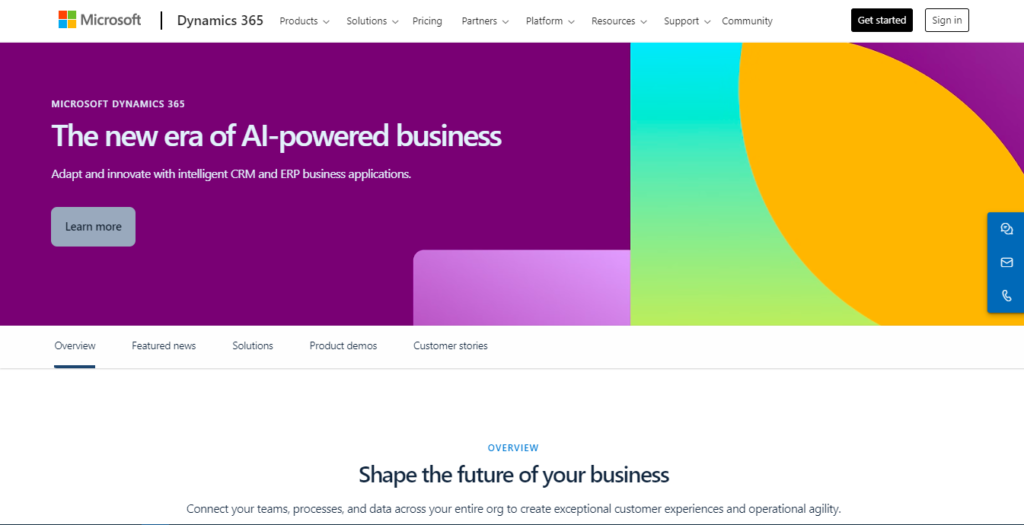
Microsoft Dynamics 365 is indeed one of the strongest Salesforce alternatives, offering a comprehensive suite of CRM and ERP solutions. It seamlessly integrates with other Microsoft products like Office 365, SharePoint, Teams, and Outlook. This can be advantageous for companies already heavily invested in the Microsoft ecosystem.
On the other hand, it provides a user-friendly interface that aligns closely with other applications. Its interface may be more familiar to users accustomed to Microsoft products, potentially reducing the learning curve. Plus, industries like manufacturing, retail, and government sectors favor 365 due to its strong ERP capabilities.
For the sake of comparison, Salesforce offers extensive customization through its declarative tools and coding capabilities. Dynamics 365’s customization, while robust, maybe more accessible for users familiar with Microsoft tools like Power BI, Power Apps, etc.
Additionally, Salesforce’s UI is known for being highly customizable but might have a steeper learning curve. Dynamics 365’s UI resembles Microsoft’s other products, potentially making it easier for users familiar with Office applications.
2. Hubspot CRM
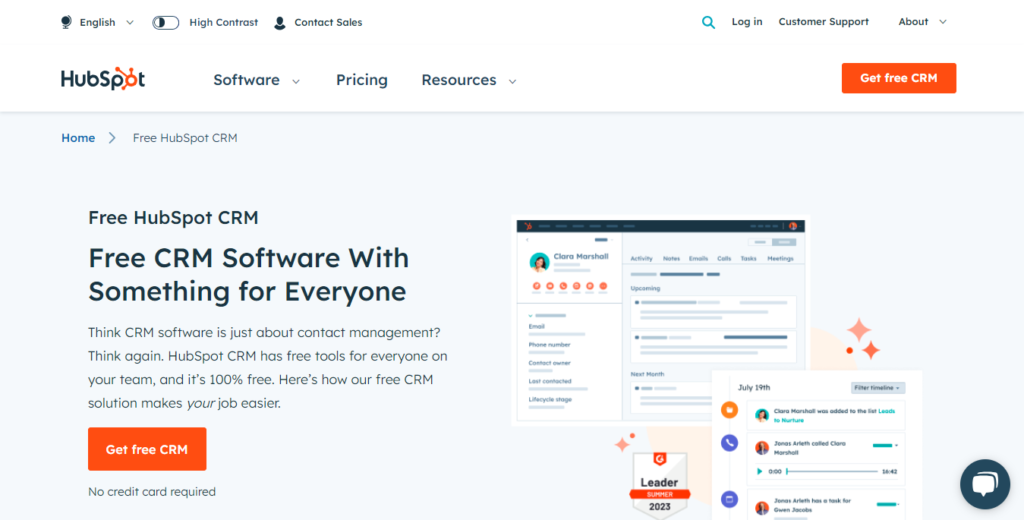
Hubspot is also among some amazing Salesforce alternatives. It is particularly suitable for smaller businesses or those seeking a more user-friendly and straightforward CRM solution. It offers a free version with core CRM functionalities, making it an attractive option for startups and small businesses. Its pricing tiers are generally more straightforward compared to Salesforce’s pricing, which can be complex and costly, especially for advanced features.
Moreover, HubSpot’s strength lies in its alignment of marketing and sales tools within the CRM, providing a more holistic view of the customer journey. Salesforce does offer similar integrations, but HubSpot’s native integration of marketing and CRM functionalities can be more seamless.
However, since Hubspot is more focused on empowering small-scale or medium-scale businesses, large companies may want to stick to Salesforce or seek other Salesforce alternatives. Salesforce offers extensive customization options and is highly scalable to meet the needs of large enterprises. HubSpot CRM’s customization capabilities might be more limited in comparison, primarily designed to cater to the needs of smaller to mid-sized businesses.
3. Zoho CRM
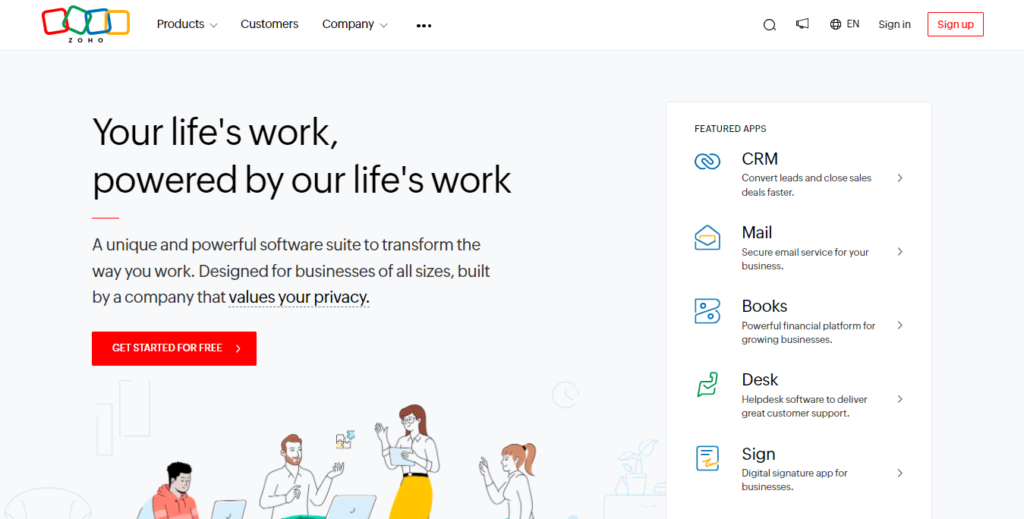
Zoho CRM also stands out among Salesforce alternatives for its affordability. Its pricing tiers are generally more cost-effective compared to Salesforce, making it a viable option for companies with budget constraints. Additionally, it provides a user-friendly interface, making it relatively easy to navigate and adapt.
Although both platforms offer integration with various third-party applications, Salesforce’s ecosystem might be more extensive. Hence, it supports a wider range of integrations compared to Zoho CRM. However, managing these integrations is quite a lot complex and sometimes requires a specialist’s hiring.
In this context, Zoho CRM boasts an intuitive interface that’s easy to navigate, making it highly accessible for users without extensive technical expertise. This simplicity can significantly reduce the learning curve compared to Salesforce, appealing to businesses looking for a straightforward CRM solution.
4. Zendesk Sell

Next, we have Zendesk Sell on our list of Salesforce alternatives. Its former name was Base CRM, especially for businesses seeking a user-friendly, sales-focused CRM solution. People usually praise it for its intuitive and sales-centric interface, designed to streamline sales processes and improve productivity. Its user-friendly design often appeals to sales teams, potentially reducing the learning curve compared to Salesforce’s more extensive functionalities.
Moreover, it provides robust sales pipeline management tools and forecasting capabilities. Its emphasis is on sales-centric features, such as pipeline visibility, contact management, and deal tracking. Additionally, Zendesk offers competitive pricing, especially for businesses focusing primarily on sales functionalities.
On the other hand, Zendesk Sell provides a mobile app that its users praise for its functionality and ease of use. In this way, it allows sales reps to manage tasks, contacts, and deals on the go. Salesforce also offers mobile capabilities, but people prefer Zendesk Sell’s mobile app due to its simplicity.
5. Monday.Com
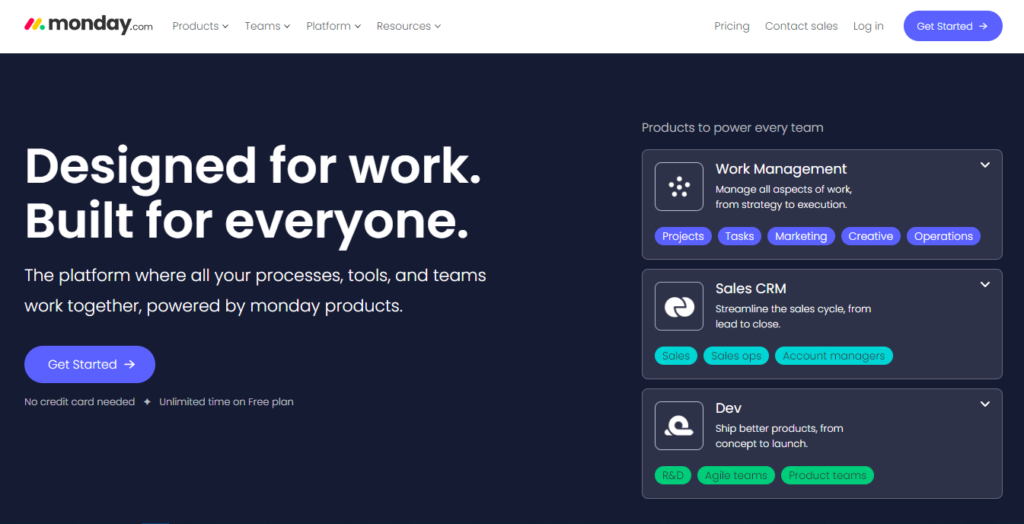
Monday.com primarily operates as a versatile work operating system, often utilized for project management and team collaboration. This simplicity might be more appealing to teams looking for a straightforward and visually driven solution. On the other hand, its flexibility allows for easy customization, enabling teams to create workflows and processes tailored to their specific needs.
Monday.com excels in team collaboration and project management, offering features for task assignments, progress tracking, and communication within teams. This focus on collaboration might be more pronounced and user-friendly on Monday.com compared to Salesforce.
Moreover, its strong emphasis on collaboration and task management may provide a more seamless and intuitive experience for teams focused primarily on these aspects. Plus, Monday.com’s agility in setting up and customizing workflows might be more accessible and quicker. It is great for teams requiring a customizable solution without the complexities, making Monday.com one of the best Salesforce alternatives for them.
6. Pipedrive
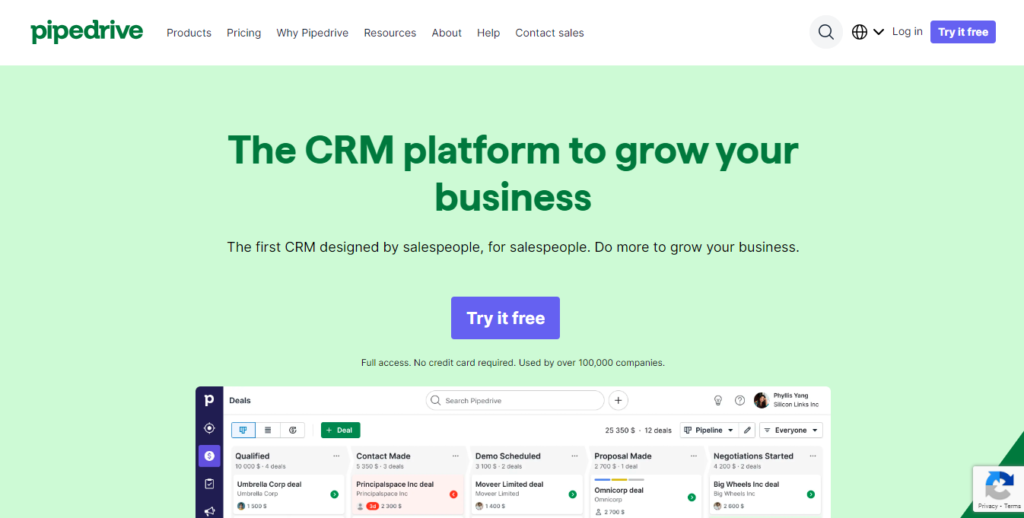
Pipedrive stands out as one of the most robust Salesforce alternatives. It is highly suitable for businesses seeking a streamlined and focused approach to sales pipeline management. Pipedrive specializes in sales pipeline management, offering a user-friendly interface specifically designed to optimize sales processes and deal management. Typically, users find this intuitive design more straightforward and great for sales workflows compared to Salesforce.
Its user-friendly interface and intuitive design often appeal to users seeking an easier CRM solution. Additionally, its visual representation of the sales pipeline and deal tracking allows for easy monitoring and management of sales stages. This visual approach might offer a more intuitive and user-friendly experience for sales teams compared to Salesforce.
On the other hand, Pipedrive’s quick setup and straightforward implementation make it an attractive option for teams looking for a CRM solution that can be deployed rapidly without extensive customization efforts.
Conclusion
Although Salesforce is a great CRM solution, it is not suitable for every business out there, and some may want an even better option. Hence. Salesforce alternatives are the first thing they look for. If you are also seeking an alternative, you can select one of the platforms mentioned above. We hope it will fulfill your company’s CRM needs.
